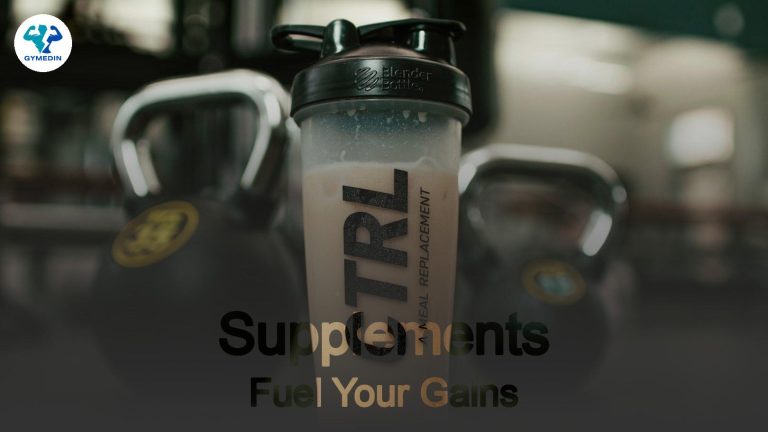When you’re aiming to pack on muscle, the right supplements can give you the edge you need. But with so many options on the market, it can be tough to figure out which ones are actually worth your money. From protein powders to amino acids, let’s break down the best supplements that can help you grow some serious muscle and support your overall fitness journey.
The Basics of Muscle Growth
Before we dive into the supplements, let’s get something straight—muscle growth doesn’t just happen because you’re popping pills or drinking shakes. It comes from hard work, consistency, and, of course, proper nutrition. When you train, you’re actually tearing your muscles down. Your body repairs these tiny tears and, in doing so, makes your muscles bigger and stronger. Supplements are just the tools to make that repair process faster and more efficient.
Primary Supplements for Muscle Growth
1. Protein Powders: The Building Blocks
If you’re lifting and not getting enough protein, you’re wasting your time. Protein is the main ingredient your body uses to rebuild muscle. While you can (and should) get protein from whole foods like chicken, eggs, and fish, sometimes it’s just easier to throw back a protein shake. Plus, after a hard workout, your muscles are screaming for protein.
Types of Protein Powders:
– Whey Protein: The most popular option. It’s quickly absorbed and contains all essential amino acids.
– Casein Protein: Digests slower, making it great for bedtime to fuel your muscles overnight.
– Plant-Based Protein: Options like pea or hemp protein work for vegans or anyone avoiding dairy.
Pro Tip: A good rule of thumb is aiming for 20-30 grams of protein within an hour after your workout.
2. Creatine: Strength and Size Boost
Creatine is one of the most researched and proven supplements for muscle growth. It helps you push out those last few reps by giving your muscles more energy. With creatine, you’re essentially fueling your body’s quick energy system, which leads to bigger lifts and, eventually, bigger muscles.
- How it Works: Creatine boosts the amount of ATP (your body’s energy currency), allowing you to train harder and longer. More energy means more gains.
- When to Take It: Creatine is effective whether taken pre- or post-workout, just make sure you’re consistent with it. Around 5 grams a day is the sweet spot.
3. Branched-Chain Amino Acids (BCAAs): Recovery Power
BCAAs (leucine, isoleucine, and valine) are a group of essential amino acids that play a major role in muscle recovery. They’re found in protein-rich foods but are also available in supplement form. BCAAs can reduce muscle soreness and improve endurance, making your recovery game much stronger.
- Leucine: The superstar of muscle growth. It activates protein synthesis, the process that repairs and builds muscle.
- When to Use Them: BCAAs are great during workouts to keep energy levels up or post-workout to jumpstart muscle recovery.
4. Beta-Alanine: Endurance and Performance
Ever feel that burning sensation in your muscles during a tough workout? That’s lactic acid building up. Beta-alanine helps buffer this acid, letting you push harder for longer. It’s especially beneficial for those doing high-rep sets or endurance-based training.
- How It Helps: Delays muscle fatigue so you can squeeze out those extra reps.
- The Tingle: Some people experience a tingling sensation after taking beta-alanine. Don’t worry—it’s totally normal and harmless.
5. L-Glutamine: Recovery and Immune Support
Glutamine is an amino acid that helps repair muscle and supports your immune system, which can take a hit when you’re training hard. It’s not essential, but if you’re going super heavy or doing lots of volume, glutamine can aid recovery.
- When to Take It: After your workout or before bed to promote overnight recovery.
Secondary Supplements for Enhanced Results
1. Fish Oil: Reduce Inflammation
Fish oil is packed with omega-3 fatty acids, which reduce inflammation and can help ease post-workout soreness. Less soreness means you can get back in the gym faster, which equals more gains over time.
2. Multivitamins: Filling the Gaps
Your muscles need a range of vitamins and minerals to grow. A solid multivitamin ensures you’re not missing out on essential nutrients like Vitamin D, Magnesium, and Zinc—critical players in muscle function and recovery.
3. Pre-Workout Supplements: Boost Your Energy
When you’re low on energy and dragging your feet into the gym, a pre-workout can give you that much-needed boost. Most pre-workouts include caffeine, beta-alanine, and nitric oxide boosters to increase blood flow, which helps with better pumps.
- Watch Out: Too much caffeine can leave you jittery or crash hard post-workout. Go for moderate doses (150-200 mg of caffeine).
Choosing the Right Supplement for You
There’s no one-size-fits-all when it comes to supplements. It all depends on your fitness goals, diet, and training intensity. Here are some things to think about before you buy:
- Your Diet: If you’re already hitting your protein targets with food, you might not need a protein powder. Focus on other supplements that fill gaps.
- Your Workouts: If you’re doing short, high-intensity workouts, creatine and beta-alanine will be your best friends. For longer endurance workouts, BCAAs or glutamine might be more useful.
- Your Goals: Trying to bulk up? Go for whey protein and creatine. Looking to recover faster? BCAAs and glutamine can help.
FAQs: Supplements for Muscle Growth
1. Do I really need supplements to grow muscle?
Not necessarily. If your diet is on point and you’re training hard, you can build muscle without supplements. But they do make things a whole lot easier and faster.
2. When is the best time to take protein?
The golden hour is within 30-60 minutes after your workout, but don’t stress if you miss it. As long as you’re hitting your protein goal for the day, you’ll be fine.
3. Can I mix creatine with protein powder?
Absolutely! Mixing creatine into your post-workout shake is a convenient way to get both at once.
4. How long does it take to see results from supplements?
It depends on the supplement and how consistent you are. Creatine, for example, can take a week or two to fully kick in, while protein’s effects depend on how much you’re getting overall.
5. Are supplements safe?
For the most part, yes—especially when taken as directed. Always stick to recommended dosages, and consult with a healthcare professional if you have any concerns.
Actionable Tips: Maximize Your Muscle Growth with Supplements
Now that you’ve got the lowdown on supplements, here are some tips to really take your gains to the next level:
- Consistency is Key: Supplements only work if you take them regularly. Set a reminder or keep them in a place where you’ll see them daily.
- Pair with a Balanced Diet: Supplements are just that—supplements. They’re meant to add to your diet, not replace real food. Make sure you’re eating enough calories and whole foods to support muscle growth.
- Track Your Progress: Keep an eye on how your body responds to each supplement. Are you feeling stronger? Recovering faster? Adjust your stack based on what’s working and what’s not.
Final Thoughts
There you have it—the best supplements to help you bulk up and reach your muscle-building goals. Remember, while supplements can give you that extra push, nothing beats solid training, good sleep, and a well-balanced diet. Ready to see those gains? Time to hit the gym and fuel up!





